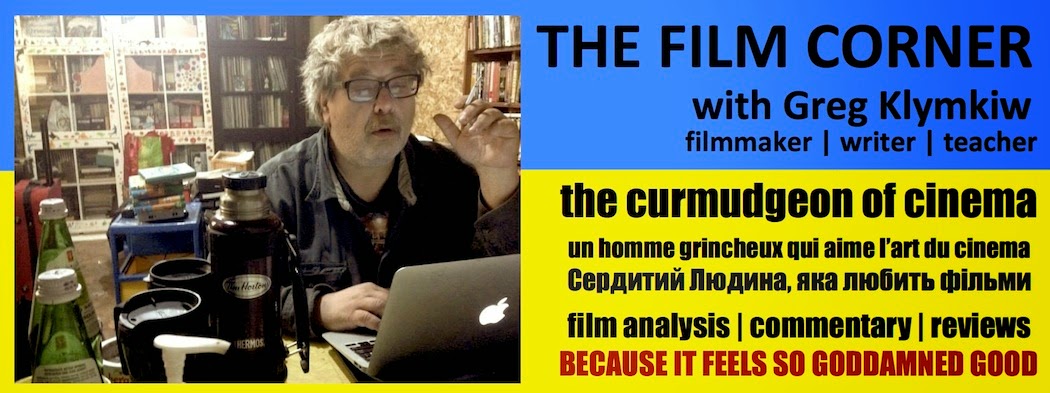The Vanishing Spring Light: Tales of West Street (2011) dir. Xun Yu "Fish" Starring: "Grandma" Jiang Su-Ha, Xiao Da Wan-Bi, Xiang Qian-Hong
****
Review By Greg Klymkiw
“How far we all come. How far we all come away from ourselves. So far, so much between, you can never go home again . . . it's good to go home, but you never really get all the way home again in your life . . . and once in a while, once in a long time, you remembered, and knew how far you were away, and it hit you hard enough, that little while it lasted, to break your heart.” - James Agee, A Death in the FamilyGrandma Jiang is dying.
Wracked with pain after suffering a massive stroke, she lies in her bed, physically unable to assume her usual perch in front of the family home on her beloved West Street. This World Cultural Heritage Site in Dujiangyan (Southwest China) in the Sichuan Province near the site of an irrigation system that was a massive feat of ancient engineering, has housed generations upon generations of families who lived a simple, traditional life.
This is where Grandma Jiang lived for 50 of her 75 years.
In the time of her life, Grandma Jiang loved nothing more than passing endless days on the porch - smoking cigarettes, taking in the sights and sounds passing by this historic street that once served as the gateway to the Silk Road and sharing conversations with friends, neighbours and occasional visiting relatives. Her loyal daughter-in-law Xiao Da manages the mahjong parlour in the living room while her bumblingly good-natured son Xiang Qian drives cab, when not blind drunk, but often hung-over.
Though petty squabbles erupt amongst her daughters who live their own lives and almost grudgingly make efforts to visit and care for her, Grandma Jiang has, in the words of the Armenian-American writer William Saroyan, striven to "discover in all things, that which shines and is beyond corruption and encourage virtue in whatever heart it may have been driven into secrecy and sorrow by the shame and terror of the world".
But now, wrapped in blankets, looking like a living mummy (and still puffing on cigarettes), she is alone save for Xun Yu, the filmmaker who spent two years living with this family before taking an additional two years shooting the first of four documentaries about West Street and its gentrification (and by extension, the modernization of China).
"All I can hope for is a quick death," Grandma Joang tells Yu. "And after death? I guess I'm headed for the Afterlife. Where else can I go?"
In spite of the fact that it's about death, The Vanishing Spring Light: Tales of West Street is a celebration of life. Through the changing of the seasons, the increasing metamorphoses of West Street and the diminishing health of Grandma Jiang, Yu trains his eye upon the passage of existence. Simple, often beautifully composed shots in very long takes create a rhythm that is hypnotic and compelling.
This is a document in its purest and most poetic form. Yes, it is slow, but it is never boring. Yu allows his camera to capture all the pleasures, sorrows and intricacies of lives that are well, and in some cases, not-so-well lived. Through his caring and carefully placed lens we come to know and care for Grandma Jiang and those around her as if we were there ourselves.
This is one of the most staggering and profoundly moving documentaries I have seen in many years. In its own way, the film is as challenging as Pirjo Honkasalo's stunning exploration of the effects of the Chechen War The Three Rooms of Melancholia or Ulrich Seidl's almost unclassifiable, yet forceful Jesus, You Know or most profoundly, the late Frank Cole's masterwork of artful observation, A Life. Like those films, and even to an extent the works of Frederick Wiseman (though without his traditional lack or preparation), Yu lets life unfold as it most naturally does.
And just prior to her final death rattles, Grandma Jiang's eyes - forced by her position on the bed to look upwards, her gaze seeming to hug the infinite - she openly and alternately fears and welcomes death. She laments that she "didn't follow the teachings well", feeling now, more than ever. like "a would-be Buddhist". Though even as we hear her say this, we have clearly witnessed an individual who has lived life to its fullest and Yu's film shares this extraordinarily humanist event with us, as its subjects have shared their lives with him.
"I can only die the way I have lived," Grandma Jiang says before death.
And so it is, so it has been and so it will be for all of us.
Xan Yu's beautiful, elegiac and sometimes heart-breaking film is a testament to Grandma Jiang and all those who lived their lives as she did. As William Saroyan wrote: "In the time of your life, live — so that in that wondrous time, you shall not add to the misery and sorrow of the world, but shall smile to the infinite delight and mystery of it.”
"The Vanishing Spring Light: Tales of West Street" is currently in release via Kinosmith and in Toronto is playing at the Bloor Hot Docs Conema where the film's visionary Canadian producer and filmmaker Daniel Cross will be present for the screenings to discuss the making of the film. For showtimes and tickets, visit the website HERE.
PLEASE FEEL FREE TO ORDER ANYTHING FROM AMAZON BY USING THE LINKS ABOVE OR BELOW. CLICKING ON THEM AND THEN CLICKING THROUGH TO ANYTHING WILL ALLOW YOU TO ORDER AND IN SO DOING, SUPPORT THE ONGING MAINTENANCE OF THE FILM CORNER. BUY MOVIES HERE FOR SOMEONE YOU LOVE! OR HELL, BE SELFISH, AND BUY THEM JUST FOR YOURSELF
AMAZON.CA
AMAZON.COM
AMAZON.UK

